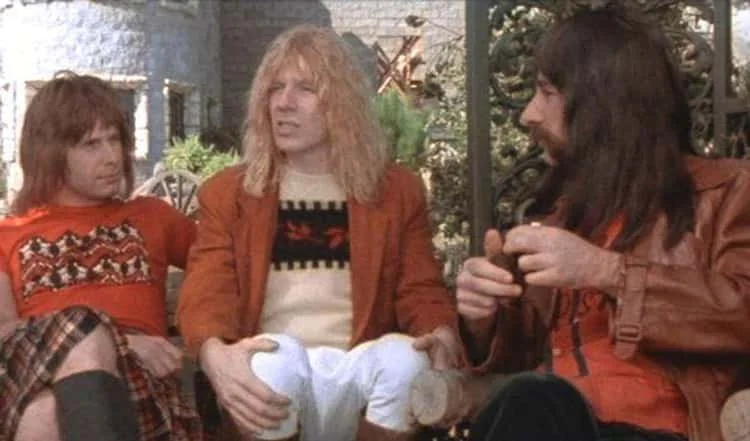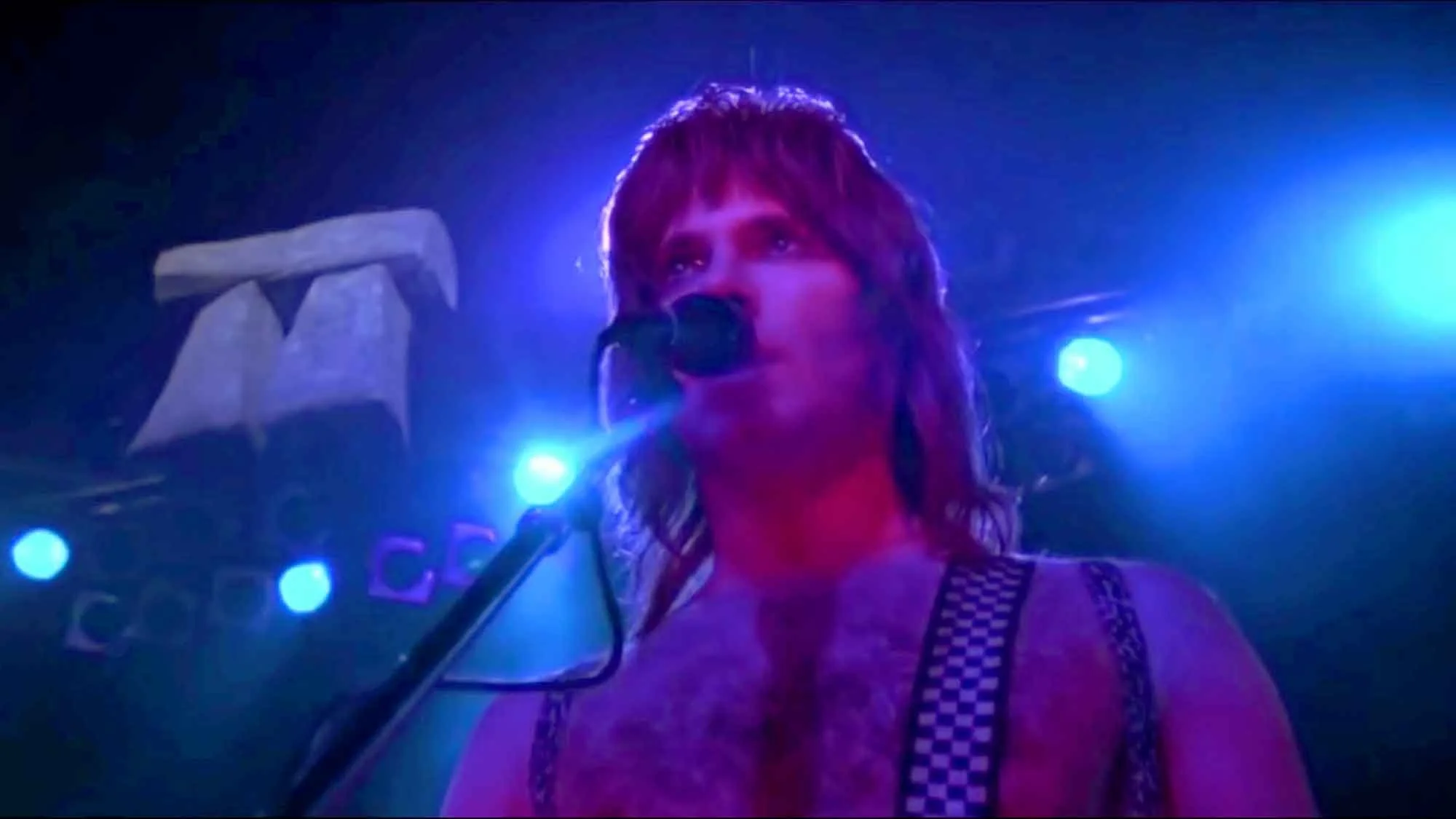This is Spinal Tap Up to Eleven
This is Spinal Tap burst on the scene in the 1980s as a milestone in the mockumentary genre, kicking off a modern creative investment in the format for film and television. Featuring the directorial debut of Rob Reiner, who also co-wrote and is an actor in the film, and led by the genius trio of Christopher Guest, Michael McKean and Harry Shearer, the film utilizes the formal elements of the documentary format to mock the stereotypes of a 1980s rock n’ roll band. The majority of the film was improvised by the actors and while humor is the driving force of the film, it also features pretty great music and also a surprising emotional climax. Let’s turn the volume up to 11 and dive into the woesome adventures of the band Spinal Tap.
Filmmaker Marty Di Bergi (Rob Reiner) opens the film with an explanation about the rockumentary he filmed with the band Spinal Tap, who was attempting a comeback with a new album and a tour around America. The film features members of the band, including David St. Hubbins (Michael McKean) and Nigel Tufnel (Christopher Guest) on lead guitar and vocals, Derek Smalls (Harry Shearer) as bassist, along with several drummers who have mysteriously died over the years - including one who spontaneously combusted on the stage. Their tour starts off successfully, but several onstage mishaps with their props and scenery, along with a miscalculated album cover choice, lead to their major tour stops falling through and the band must perform at venues that are not a match for their energy (such as performing “Sex Farm Woman” at an uptight military base). This leads to friction in the band, causing both their manager and Nigel to quit in frustration. The band attempts to limp along, managed by David’s assertive girlfriend, but their prospects look dim. David and Derek half-heartedly contemplate what their life could look like when the band dissolves, but they are saved from that unknown fate when “Sex Farm Woman” becomes a hit in Japan and the band reunites for a new tour, bringing everyone back to their proper (and dysfunctional) family.
The mockumentary genre, which is a blend of the terms mock and documentary, is a satire of a topic using the formal elements of the documentary genre. Those aesthetic choices are immediately established in the opening footage of This is Spinal Tap, which shows the band Spinal Tap’s first concert on their American tour. There is handheld b-roll footage of the roadies unloading equipment, on-the-spot interviews of “fans” coming to see the band perform, and talking head interviews of the band themselves that include overlaid titles to introduce their names. The film also features “past” footage of the band’s early days, including a sequence that channels the Beatles youth and a second scene that features the band’s 1960s era flower power pop. This found footage and cinema verite are all performed by actors for the film, but they take on the aesthetics that are familiar in the documentary format to capture real life. This formal approach is consistent throughout the film, but there are many hints that clue the viewer in that this is not a true documentary.
The humor in the film is outlandish, but also can be quite subtle. The screenplay charted out the arc of the storyline, but individual scenes, especially the ones involving the main members of the band, were heavily improvised. The actor’s comedic genius shines through in these scenes, where you can see the actors building upon elements that a scene partner introduces; for example, the progression of their various band names, going from “The Originals” to “The New Originals,” which is a ridiculous contradiction in terms. Additionally, the famous scene where Nigel explains that his amp “goes up to 11” is Christopher Guest’s perfect delivery of Nigel’s innocent ridiculousness, showing the complete understanding Guest had over that character so that he could react to any dialogue that Rob/Marty as the director presented to him. The editing is also utilized to emphasize the humor, either cutting in footage that undercuts a character’s point or to be the button of a joke. For example, when Nigel is seriously discussing his approach to solos, the camera cuts to him onstage and the escalating antics during his solo, culminating in him using a violin to strum his guitar. Finally, the camera placement is also intentional in framing the characters and props in order to highlight the humor. The most memorable usage of this is during the famous Stonehenge performance, which captures the band rocking out to their iconic song. The camera tilts slightly upward and focuses on Nigel singing, as the Stonehenge prop starts to slowly descend from the rafters of the stage. At first, due to the camera’s angle, it is unclear the size of the prop, but slowly dawns on the viewer as it descends that this is a tiny recreation of the towering monument, which is quite an epic fail for the supposedly edgy rock and roll band.
As the film does focus on a rock and roll band, the believability of the characters hinge on whether they can deliver realistic performances of the music. And it must be stated, even though this is a comedic film that is spoofing a band, the actual music from Spinal Tap is quite delightful. The music is used as an integral piece of the film’s comedic tapestry, from the band’s historical songs to the oftimes ridiculous song title and lyrics (re: “Sex Farm Woman”), but Guest, McKean, and Shearer not only channel the (budget) glam rock era convincingly, but they are also quite talented musicians! The songs are catchy, with great hooks, clever lyrics, fantastic vocals, and stand up to repeat listening sessions. Some of the standout cuts on the album are “Hell Hole,” “Tonight I’m Gonna Rock You,” “Rock and Roll Creation,” “Stonehenge,” and “(Listen To The) Flower People.” In fact, their faux band and music was so popular, the trio have recorded three albums, done several tours, and performed together at Wembley in real life. Good thing they have their music career to fall back on in case their acting gigs fall through.
This is Spinal Tap is considered one of the top tier comedies of all time and it certainly kickstarted a generation of mockumentaries in its wake, where the camera is not just an observer, but is in on the joke as the actors break the fourth wall. The humor is timeless and is carried off by genius improvisers who nevertheless are able to channel drama and heart while also rocking out to great music! When Nigel leaves the band, the emotions are real and the viewer can’t help but root for them to re-form. Christopher Guest clearly enjoyed this format and continued the mockumentary train with Waiting for Guffman, Best in Show, and A Mighty Wind, but this film is also clearly the genesis for shows like The Office and Parks & Rec. My favorite gag of the entire film is when the band performs onstage and each of the trio start off in giant transparent pods. Slowly, each one opens and they exit to perform, however the bassist gets stuck and spends the entirety of the song attempting to break out. The roadie is desperately trying to get him out, bringing out a hammer and eventually a blowtorch; just as the song ends, he successfully breaks out and runs to the microphone, ready to perform - but seeing his partners re-enter the pods causes him confusion. He then decides to jump back in the pod just as it closes, only getting his arm in before the pod seals once again; all of these visual gags happen while they are performing a pretty great song - “Rock and Roll Creation!” As with all great comedies, this review could have just been a listing of all the funny lines and hilarious scenes, but the film manages to bring an even mix of drama, heart, rock music, and hilarity.








